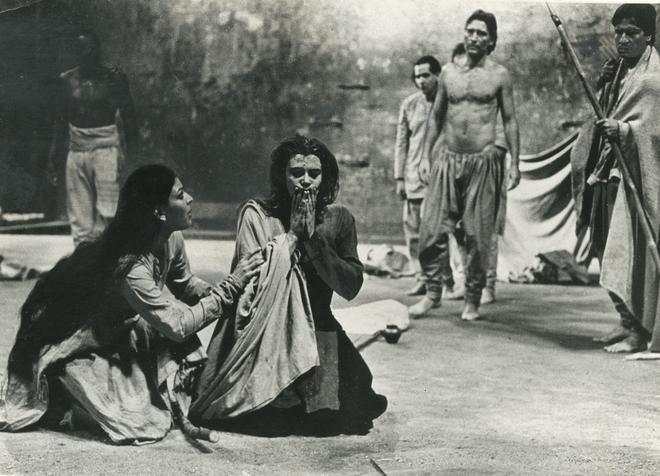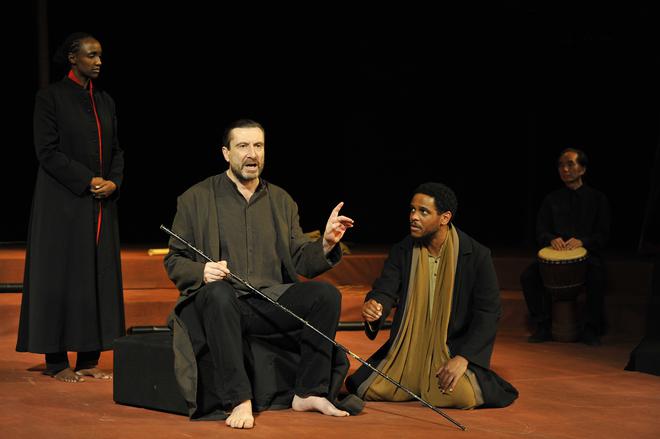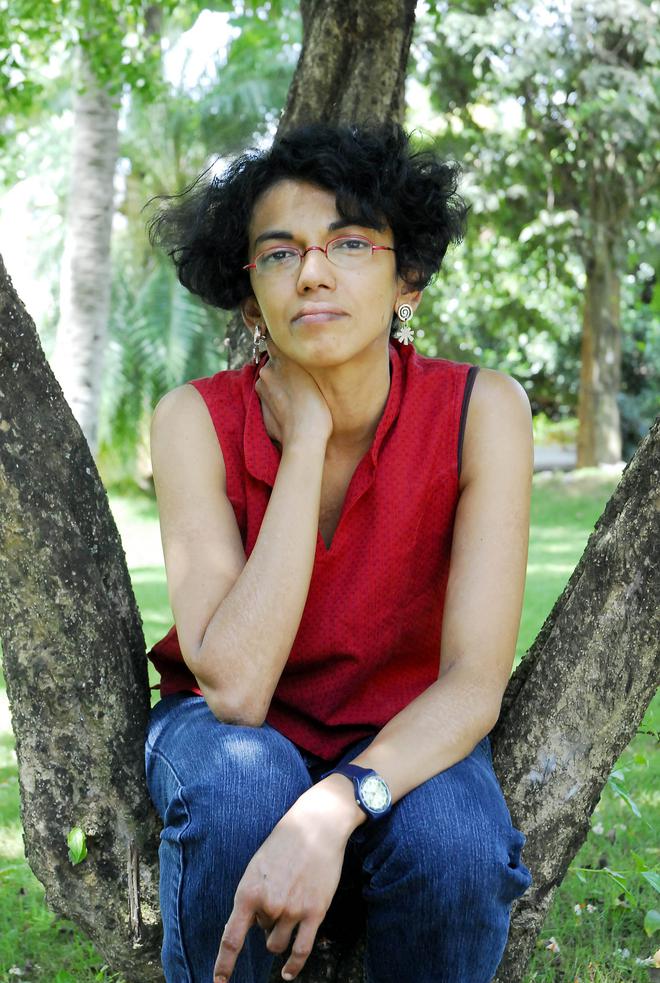There are scenes in the film version of Peter Brook’s Le Mahabharata I return to, over and over; ones that I dissect at every available platform, in print and on stage.
Take the prelude to the treacherous dice game. Duryodhana (Georges Corraface), freshly returned from Indraprastha and scalded with envy at the ethereal delights of Maya’s palace, plots the downfall of the Pandava brothers with his uncle Shakuni (Tunzel Curtis). His mother Gandhari (Hélène Patarot) begs him to desist, to seek distraction with his wives; she reminds him of all the blessings he enjoys.
Duryodhana’s response is a white-hot creature ablaze amidst the dancing flickers of dozens of nilavilakku and thookuvilakku. His voice soars as faint drum beats gather momentum like the heartbeat of a flailing earth. ‘ But I want to be discontented,’ he rages… ‘a man’s body grows from birth and everyone is delighted; in the same way his desire grows, his desire for power.’
Read | ‘Peter Brook was the force that propelled us’: Shantala Shivalingappa
Each time, I am mesmerised by this vision of the Kaurava crown prince: easily one of the most compelling and self-aware characters of the play, one who can locate the precise epicentre of his own hate, presage the consequences of his overarching greed, and still choose to act on his darkest impulses. With that one — almost throwaway — sequence, Brook (with his playwright, Jean-Claude Carrière) gives us the key to the unobtrusive notes that reverberate through Vyasa’s Mahabharata. I could instantly believe why his subjects would love Duryodhana and hail his reign, believe why the Kauravas could find far more allies than their cousins at Kurukshetra, even why Bheeshma — in the last chapters of the Udyoga Parva — is given to pangs of aching love for his wayward, charismatic, grandnephew.

And that specific perception of Duryodhana weaves through Until the Lions, my own telling of the Mahabharata in 19 voices. When “my” Gandhari tells Shakuni, ‘I’d force Time to halt, return,/ and I’d kill you myself while you were still a child,’ it is this Duryodhana — the beloved firstborn who ‘breathes wrath’ — that she would gladly kill her brother to protect. Later in the book, Georges Corraface’s explosive performance as the exacting yet irresistible friend informed my portrayal of Karna’s wife Vrishali’s initial distrust and unwilling gratitude.
Balancing canons and conflicts
Then there are moments and inconsistencies in Brook’s Mahabharata that confounded, even infuriated me for years, until I realised that one could create in retaliation, as well, to a work of art one loves reservedly; that influence need not stem from acceptance or agreement alone. Satyavati, the inevitably subjective narrator of Until the Lions, is the counterpoint to an omniscient Vyasa found in myriad Mahabharatas, not only in the Brook-ian adaptation — a position that she blazons from the outset by inverting the lines mouthed by her sage-son in the latter: ‘This is not the whole story, nor a lyrical history of mankind.’ She, and the other protagonists of my book, will speak from the interstices, with no single, infallible account, for ‘Truth is a beast more wayward than Time’.
Read | Peter Brook: the constant innovator
I have a more conflicted equation with Brook and Carrière’s characterisation of Amba/Shikhandi (played with quiet, heart-rending intensity by Corinne Jaber). When it comes to pure theatrical invention, my favourite is the opening scene of Part II: Exile in the Forest*. The five Pandava brothers and their wife Draupadi (Mallika Sarabhai) can be seen in the wilderness, when a voice shatters the silence, hailing Bhima (Mamadou Dioumé). A figure clad in black appears. It is Amba, who seeks the strongest man in the world to slay Bheeshma, the man who destroyed her life by abducting her from her swayamvara.
Yudhishthira (Andrzej Seweryn) seems incredulous: could this really be the legendary princess? ‘It was more than 40 years ago.’ Amba’s gaze — obsidian, unflinching — quells his words. ‘Hate keeps me young,’ she responds. Draupadi is less sceptical. She approaches Amba, and receives, from a gentle hand on her bowed head, solace and benediction.

Purists could find that wrong on several counts. After all, according to the canonical tellings of the Mahabharata, Amba has killed herself in a sacrificial pyre to accelerate her rebirth and revenge several decades earlier. By this point in the epic, she is well into her new avatar as Shikhandi, Prince of Panchaal, Dhrupad’s son, and Draupadi’s sibling, to boot. How could Amba then appear before them, still female, still seeking a champion to right her wrongs?
Yet, with that one anachronistic reunion, collapsing timelines and narrative continuity, the play accomplishes so much that it is nothing short of a dramaturgical sucker-punch. Suddenly, the ancestral roots of vengeance that will strangle the Kuru clan become visible, many rising from generations of cruelty towards women. Equally clear is Yudhishthira’s commitment to peace as the preferred course of action. Crucially, the shame and the pain of two memorable women of the epic find immediate mirror. In this adaptation, they are bound not by blood, but by the shared legacy of a quest for justice. Vyasa himself might applaud the liberty taken by Brook and Carrière here, so true is it to the emotional thrust of the Mahabharata.
A vital reminder
Which is why the final confrontation between Bheeshma and Shikhandi about three hours later feels utterly senseless. Here, Shikhandi forgets the reasons for their desire to kill, and puts down arms, unable to continue the duel. In the strangest — and, in my eyes, most punishing — aberration to one of the epic’s most haunting stories, Amba/Shikhandi is deprived of closure. It is Krishna and Arjuna who move in for the kill, rendering Shikhandi irrelevant.
Read | How Peter Brook’s ‘Mahabharata’ influenced creative minds across the globe
Why? Did the decision stem from Brook’s need to focus on Bheeshma’s nobility and Arjuna’s transformation into a being enlightened enough to kill his beloved grandparent for the sake of greater good?
It was tough to accept, but a vital reminder: we do not need to be driven by the same impulses, nor find the same truth, while making art.

I needed to find, and express, my vision for Amba/Shikhandi. So, in Until the Lions**, when Shikhandi confronts Bheeshma that one last time on Kurukshetra, neither Krishna nor Arjuna appears to facilitate the moment of reckoning. After two lifetimes of a bond alchemised by pain and fury into an abiding devotion of sorts, the end is resolved entirely between Bheeshma and Shikhandi, with a full recognition of the futility of the act. ‘This time, we meet — neither shall win:/ for I will slay you, but first, you shall watch me die,” in the latter’s words.
And I trust Peter Brook would understand that too, even as it is completely antithetical to his own telling. For, as actor Corinne Jaber said recently, her years of working with him could be encapsulated in the line, ‘All my life I walk and question’ (a response her character gives Draupadi in the play). It indicated his relentless search for truthfulness, to create a full-fledged world within the play, truthful to itself, above all. A world he could create, in her words, “anywhere, as long as there is space, and actors, and an audience.” Then she added, “I keep returning to the line ‘ How can death outwit death?’ from the same scene. What he leaves behind is so rich, so enormous, it transcends death.”
The writer is a poet, librettist and dance producer. She is the author of several books, including the award-winning Until the Lions: Echoes from the Mahabharata .
* The description that follows is a variation of one included in a paper titled True Lies (The Licence to Create & Kill in Adaptations) the author presented at Presidency University Kolkata in 2017.
** Both the book and its principal adaptations, Akram Khan’s 2016 dance piece and the forthcoming opera directed by Shobana Jeyasingh for Opéra national du Rhin in September.







